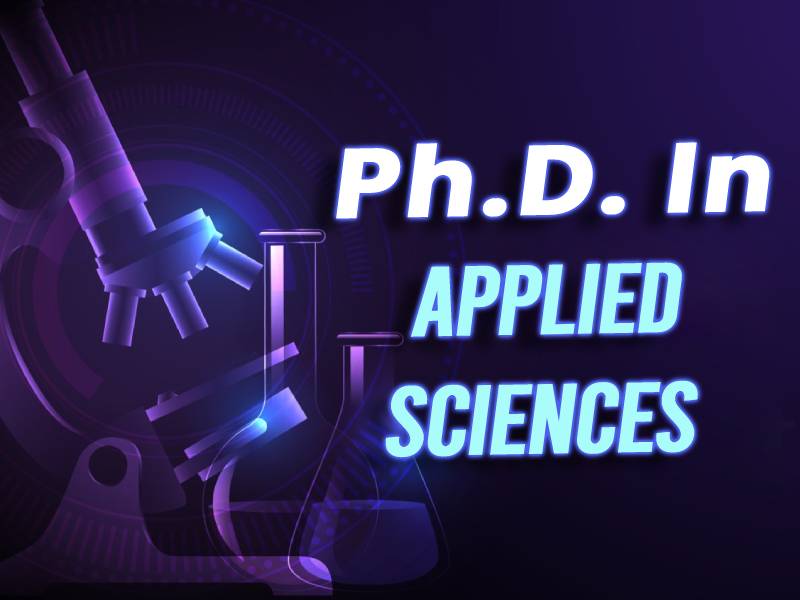Ph.D. in Applied Sciences: Introduction, Admission, Registration, Eligibility, Duration, Fees, Syllabus 2024

Introduction:
A Ph.D. in Applied Sciences is a gateway to mastering the practical applications of scientific knowledge across various industries. This rigorous program is designed for those who aspire to drive innovation and solve complex challenges through research. With a focus spanning from biotechnology to environmental science and engineering, the degree prepares graduates not only for academic roles but also for leadership positions in research, industry, and government. In this blog, we'll explore what it takes to pursue a Ph.D. in Applied Sciences and the opportunities it presents.
Admission Process:
- Application Submission: Prospective students must submit a detailed application including their academic transcripts, a statement of purpose, letters of recommendation, and a CV showcasing their achievements.
- Standardized Tests: Many programs require GRE scores, and depending on the focus area, additional tests like the GRE Subject Test in Chemistry, Physics, or Biology might be necessary.
- Research Proposal: Applicants often need to submit a proposal that outlines their research interests and potential projects, aligning with the expertise available within the faculty.
- Interviews: Selected candidates are usually interviewed by faculty members to assess their motivation, research potential, and fit within the program.
- Prerequisite Knowledge: Applicants should have a relevant master's degree or equivalent background in a related scientific discipline.
- Funding Application: Simultaneously, candidates should apply for funding, whether internal scholarships or external grants, as part of the admission process.
Eligibility:
- Educational Background: A master’s degree in a science-related field is typically required, with substantial coursework in the intended area of Ph.D. study.
- Research Experience: Demonstrable experience, such as involvement in scientific projects, publications, or conference presentations, is highly regarded.
- Technical Skills: Proficiency in specific technical skills or laboratory techniques depending on the research focus, such as computational modeling, genetic engineering, or spectroscopy.
- Analytical Skills: Strong analytical and mathematical skills are essential for data analysis and problem-solving in research.
- Professional Recommendations: Letters from academic or professional sources that can attest to the applicant’s capabilities and potential in research.
- Language Proficiency: For non-native speakers, proficiency in the language of instruction (often English) is required, evidenced by scores from TOEFL or IELTS.
Completion Time:
Typically, a Ph.D. in Applied Sciences takes between 4 to 6 years to complete, depending on the research scope, the student's progress, and the specific requirements of the program.
Career Opportunities:
- Academia: University professor, research fellow, or academic advisor.
- Industry: Leading roles in R&D departments of industries like pharmaceuticals, technology, and manufacturing.
- Government Research: Scientists in government agencies focusing on health, environment, energy, and defense.
- Consulting: Science consultants providing expertise to businesses and government bodies on technical issues.
- Entrepreneurship: Starting innovative businesses based on technological and scientific products.
- Non-profit Organizations: Leading research initiatives and projects that address societal challenges.
Syllabus:
- Advanced Research Methodologies: Training in quantitative and qualitative research methods.
- Specialized Courses: Depending on the field, courses may include Advanced Organic Chemistry, Molecular Biology, Quantum Mechanics, or Environmental Assessment.
- Statistics and Data Analysis: In-depth statistical analysis techniques tailored for large datasets.
- Grant Writing and Publication: Skills for writing successful research proposals and scholarly articles.
- Ethics in Research: Understanding ethical issues in scientific research and responsible conduct.
- Innovation and Commercialization: Translating research findings into marketable products and services.
Internship Opportunities:
- Corporate Internships: Positions in top science companies to gain industry-specific skills.
- Research Labs: Hands-on experience in government and private research labs.
- International Research Programs: Opportunities to work with international research teams.
- Healthcare Settings: Especially for those focused on biomedical sciences.
- Environmental Agencies: Working on real-world environmental issues.
- Startup Collaborations: Experience in startup environments focusing on innovative solutions.
Scholarships and Grants:
- University Fellowships: Many universities offer fellowships that cover tuition and provide a living stipend.
- Government Grants: Federal and state grants for specific research projects or fields of study.
- Private Sector Scholarships: Companies often fund research in areas of strategic interest to them.
- International Scholarships: Opportunities funded by international governments or organizations.
- Travel Grants: For presenting at international conferences and workshops.
- Need-Based Awards: Financial support based on personal circumstances.
FAQs:
What is the difference between a Ph.D. in Applied Sciences and a traditional Ph.D. in Science?
The focus of an Applied Sciences Ph.D. is on practical application and problem-solving in real-world scenarios, whereas a traditional Ph.D. might focus more on theoretical aspects.
Can I pursue a Ph.D. part-time?
Some programs offer part-time Ph.D. options, but this extends the completion time.
What kind of support system is available for Ph.D. students?
Most programs offer mentoring, advising, and access to professional networks.
How competitive are admissions for these programs?
Admissions can be highly competitive, especially in programs that offer substantial funding.
Are there opportunities for interdisciplinary research?
Yes, many programs encourage interdisciplinary approaches to address complex scientific questions.
